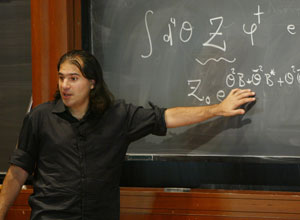
This is a profile of a great emerging scientist, anyone within a distance of 100 miles should listen to him in person on Friday, October 26,Institute for Advanced Study, Einstein Drive, Princeton, New Jersey 08540 USA. At 5:30 p.m. in Wolfensohn Hall on the Institute campus:
Nima Arkani-Hamed Friday, October 26, will give a public lecture to discuss the Higgs Boson and Its Paradoxes in Lecture at Institute for Advanced Study. Nima Arkani-Hamed will explain the principles behind the Higgs boson as well as the new mysteries its discovery opens up. The lecture will take place at 5:30 p.m. in Wolfensohn Hall on the Institute campus.
Nima Arkani-Hamed was on born 5 April 1972 is a Iranian/Canadian/American theoretical physicist with interests in high-energy physics, string theory and cosmology. Arkani-Hamed is the son of Professor Jafar Arkani-Hamed, who used to chair the physics department at Tehran’s Sharif University of Technology and who is now currently emeritus professor of earth and planetary sciences at McGill University in Montreal .
AES says that ”he is one of the leading particle physics phenomenologists of his generation, Nima Arkani-Hamed is concerned with the relation between theory and experiment. His research has shown how the extreme weakness of gravity, relative to other forces of nature, might be explained by the existence of extra dimensions of space, and how the structure of comparatively low-energy physics is constrained within the context of string theory. He has taken a lead in proposing new physical theories that can be tested at the Large Hadron Collider at CERN in Switzerland.”
According to a press release of AES ”the principles of relativity and quantum mechanics place powerful constraints on the structure of physical laws. With these principles alone, it is possible to understand the broad features of why the world around us is the way it is, consisting of matter, made of particles like electrons and quarks, interacting with forces, like gravity, electromagnetism and strong and weak nuclear forces. Our present framework for physics is so tightly woven that it is very difficult to modify it without destroying its successful properties. This provides a strong check on theoretical speculations and helps guide us to a small set of candidates for new laws.”
In this talk, Arkani-Hamed will illustrate these ideas in action by explaining why theoretical physicists knew the Higgs boson had to exist long before it was discovered at the Large Hadron Collider last July. While the discovery of the Higgs is a triumph for both experimental and theoretical physics, its existence opens up a set of profound conceptual paradoxes, whose resolution is likely to involve radical new ideas. The talk will conclude with a description of some possible avenues of attack on these mysteries, and what we might learn about them from the LHC in this decade.
Arkani-Hamed was one of four members of the School of Natural Sciences Faculty to receive the inaugural Fundamental Physics Prize, with an award of $3 million each, honoring path-breaking ideas in fundamental physics. Arkani-Hamed is also the recipient of the Gribov Medal and the Raymond and Beverly Sackler Prize in Physics, among other honors.
“It’s a triumphant day for fundamental physics. Now some fun begins.” (Nima Arkani-Hamed, ‘New York Times’ ‘on discovery of a particle consistent with the Higgs boson.)
Arkani-Hamed received his Ph.D. in 1997 from the University of California, Berkeley, where he then worked as a postdoctoral fellow at the SLAC National Accelerator Laboratory. He became an Assistant and then an Associate Professor at Berkeley before moving to Harvard University in 2002 as a Professor. In 2008, he joined the Faculty of the Institute for Advanced Study. The Institute for Advanced Study is one of the world’s leading centers for theoretical research and intellectual inquiry.
The Institute exists to encourage and support fundamental research in the sciences and humanities—the original, often speculative, thinking that produces advances in knowledge that change the way we understand the world. Work at the Institute takes place in four Schools: Historical Studies, Mathematics, Natural Sciences and Social Science. It provides for the mentoring of scholars by a permanent Faculty of no more than 28, and it offers all who work there the freedom to undertake research that will make significant contributions in any of the broad range of fields in the sciences and humanities studied at the Institute.






